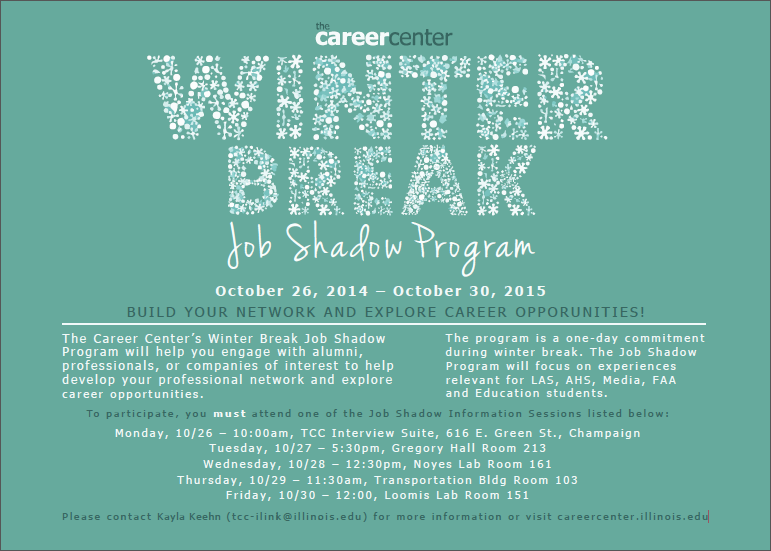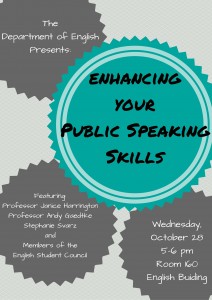by Valerie O’Brien
Last night’s panel, “Enhancing Your Public Speaking Skills,” featured great advice that was both appropriate for public speakers of all experience levels and applicable to a range of contexts, from class presentations to job interviews.
Here are 5 pieces of advice from panelists Professor Janice Harrington (Creative Writing), Professor Andrew Gaedtke (English), and undergraduate Stephanie Svarz (Theater and English):



- “Public speaking is about experience, not talent.”
All three panelists agreed that public speaking becomes more comfortable the more you do it. So, Professor Harrington suggested, you should create opportunities for yourself to practice speaking publicly: present your research at a small conference, for instance, or gather a group of your friends to discuss a paper. Additionally, you can learn from public speakers you admire. Pay attention to the practices of your favorite professors, politicians, or TED Talks presenters; try to imitate their public speaking persona. But also, Harrington and Svarz advised, “do you” – not all presentation habits will work for everyone, and it’s important that you remain authentic.
- “Find your power stance”
In particular, Svarz cited the Alexander technique, which recommends planting your feet in a strong base, keeping your knees unlocked, relaxing your shoulders, and keeping your head up. This method is effective for public speaking because it enables you to receive energy from and respond to your audience as they react to your performance. Harrington also stressed the influence of the body on public speaking: eye contact, deep breathing, projecting (by opening the mouth wider to make the voice bigger), and deliberate pacing can be great tools for calming nerves and delivering a strong speech.
- “Public speaking is a mechanism for discovery.”
Professor Gaedtke characterized public speaking as an opportunity to think originally on the spot. He elaborated that you can think of public speaking as a chance to continue to develop your ideas, even about a topic you’ve thought about extensively. In that regard, public speaking is not only a means of sharing ideas, but also a creative act in which your audience participates. This demonstration of the way someone thinks (rather than simply what they think) can be public speaking’s most compelling outcome, he suggested.
- “Speaking on the fly is only possible if you’ve prepared rigorously.”
All three speakers stressed preparation and improvisation as keys to successful public speaking. It is preparation that enables improvisation, Gaedtke explained, while Svarz emphasized that preparation is all that you (as public speaker) can control. Always rehearse your speech beforehand to familiarize yourself with the material about which you’ll be speaking.
- “You are the expert in the room on whatever you’re speaking about.”
Selecting an angle on your topic that reflects your unique interests, Svarz suggested, can help you to recognize your own expertise. In encouraging public speakers to “develop a confidence habit” and thereby “break the habit of self-loathing.” Harrington also spoke to this idea. This combination of confidence and passion can accentuate your own interest in your topic and keep your audience invested as well
If you want other great tips on professional and academic development, check out some of our other upcoming events, listed at http://publish.illinois.edu/englishadvising/events/.



 Wed., 10/29. 5 – 6pm in EB 160: Enhancing Your Public Speaking, with Prof. Dale Bauer, Prof. Janice Harrington, Prof. Andrew Gaedtke, and members of the ESC.
Wed., 10/29. 5 – 6pm in EB 160: Enhancing Your Public Speaking, with Prof. Dale Bauer, Prof. Janice Harrington, Prof. Andrew Gaedtke, and members of the ESC.